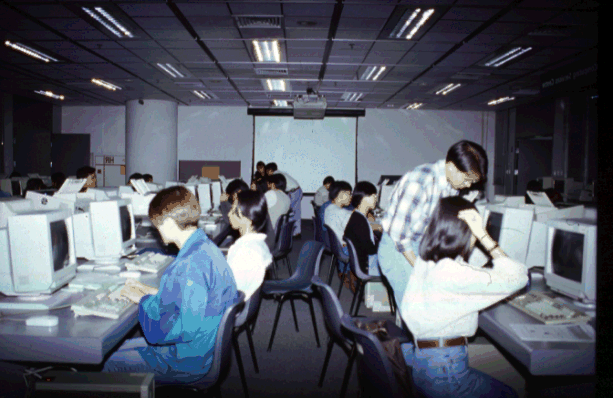



Computer complex
Students always find computer facilities insufficient
By Teresa Fung
Despite the continuous enhancement in network development, the students, on the other hand, are frustrated by the existing insufficiencies of computing facilities in universities. According to Mr. Joseph Leung, the duputy director of the Computing and Telecommunication Service Center of the Hong Kong Baptist University, frequent improvements in the campus network has been made to cope with the escalating demand. Said he: “Improvements are made every year. Among them, the recent implementation of the Fibre Data Distribution Interface is the most significant. “With a tremendous increase in bandwidth — the information capacity of a telecommunication channel, the interface supports an advanced and high speed data transfer.” Meanwhile, the Polytechnic University has spent $6.8 million on using the “Asynchronous Transfer Mode” which makes faster data transfer possible. According to Mr. Victor Cheng, the manager of the Computer Information Centre at the Hong Kong University of Science and Technology, development of “computer culture” is mainly due to the advanced computer networks. Said he: “Computing nowadays means network. Students lacking computer knowledge will miss many chances in the future.” Extensive services and facilities are available on the campus networks. Students can access the computer resources in different institutions both locally and overseas through electronic mail, bulletin board, library searches and news groups. “Inter-personal communication can be enchanced through network communication,” said Mr. Leung. “Students can improve their communication skills and English standards through active participation in these communications.” According to Mr. German Cheng, a Year 2 student in the Department of Business Administration at the University of Hong Kong, networks ensure an off-campus communication. “Students can save much time and effort in obtaining notes and sending homework to the lecturers. “Besides, students can consult the lecturers off-campus at any time,” he said. Many students are also attracted by the wide scope of information in the network. Mr. Fung Hoi Wai, a freshman in the Department of Computer Science at The Chinese University of Hong Kong, said, “It is marvelous to widen the horizon through down-loading information from the Internet.” In addition,through a world-wide exchange of information, the network speeds up the intensive research in the universities. “Academic researches are essential to universities. The network can help us in obtaining the latest world-wide information and discussing with the foreign experts,” Mr. Cheng of the University of Science and Technology said. “Besides, the efficiency and production capacity of the administration procedures can be increased,” he added. Although the universities have tried their best to meet the demand of the students, complaints are still exist. Mr. Frankie Lai, a freshman in the Department of Business Administration at the University of Hong Kong, said, “Most of the students only use computers for data processing. A tremendous increase in data transfer speed cannot bring much utility to students. Many students still suffer from the lack of computer facilities.” However, Mr. Cheng of the University of Science and Technology claimed that this situtation is inevitable. He explained, “It is a dilemma between general and professional education. “As professional researches are essential to universities, a certain amount budget must be reserved to satisfy the researchers’demand on the first hand. “The only solution is to strike a balancing various needs of different people,” said he. Futhermore, the students found the lack of assistance from the university frustrating. Miss Celia Ho, a freshman in the Department of Law at the University of Hong Kong, said, “As a beginner in using computer, I am always afraid of infecting the system. “However, the support from the university is scanty. I feel helpless when encounting computer problems.” Nonetheless, the professionals in the universities claimed that they have provided adequate support to the students. Mr. Leung of the Baptist University said, “Many optional courses are provided at the beginning of each academic year. “Through a precise introduction, new students and staff can adapt to the development of the campus network system easily.” “Besides, talks, seminars and fairs are frequently organized to keep students aware of the new technological development,” he added. Nevertheless, programmes on comuting knowledge arranged by computer centre at the University of Science and Technology seemed unsuccessful as students do not participate enthusiastically in these activities. According to Mr. Cheng, the primary constraint for improvements is the lack of resources. “With limited budget, the university simply cannot satisfy every students’ needs. We can only make the most out of the scarce resources,” he said. Said Mr. Raymond Poon, the associate director of the Computing Service in the Computing Service Centre at the City University, “The greatest difficulty is to estimate the students’ future need. “In the City University, a ‘booking system’ is used to ease capacity planning. The amount of time that can be used by each students are allocated by the Computing Service Centre according to the lecturers’ estimation about the need of students in each course. “However, the staff always exaggrate the time needed by the students. Consequently, our booking system doesn’t work very well,” Mr. Poon added. In addition, the misuse of network is getting more serious. Students can easily put in and down-load some unethical information from the network. “This is an unavoidable side-effect of the network expansion,” the Baptist University’s Mr. Leung explained. Mr. Poon said, “Posing censorship on the usage of computer services would mean depriving the students’ freedom of speech. “There is simply no standard scale to measure the seriousness of the misuse of the network,” Mr. Fung of the Chinese University said. Nevertheless, the Baptist University is eliminating some obscene elements from the network. Heavy punishment will also be imposed on the identified abuser of the computing services.
“Warning will be given to the abuser. Then they will be prohibited from using any computing services.
“Students need to be considerate when using the network,” said Mr. Leung.
|

December 1995

